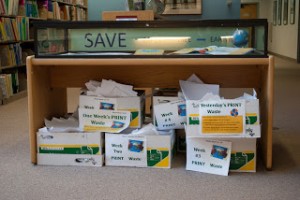During the month of March, Van Wylen Library collected the waste paper left at the end of the day from the printers on the first and second floors of the library. The paper was then assembled into a display on the second floor of the library near Tech Services in order to raise awareness about sustainability and earth-friendly practices on campus during the month of April, when Earth Day is traditionally celebrated.
 Reducing paper waste is a part of Hope’s campus-wide sustainability campaign. Printers on campus are set to print double-sided on 30% post-consumer content recycled paper. However, Hope uses an incredible amount of paper. Since January, patrons in Van Wylen have printed over 405,000 pages.
Reducing paper waste is a part of Hope’s campus-wide sustainability campaign. Printers on campus are set to print double-sided on 30% post-consumer content recycled paper. However, Hope uses an incredible amount of paper. Since January, patrons in Van Wylen have printed over 405,000 pages.
To do your part to reduce paper waste at the library and around campus:
1. Only print when you need to! Save your document to PDF and read it on a computer or e-Reader. This also applies to making copies from printed materials. The library’s multi-functional peripheral copiers allow users to email PDF versions of documents to themselves or to save to a USB.
2. Send your job once and be patient. Make sure you know what printer your job was sent to. If your job doesn’t go through, ask for help before printing a second time. Referencing CIT’s library printing instructions can help.
3. Pick up your job and be sure not to accidentally take someone else’s job!
4. Proof before you print. This eliminates the need to print twice.
5. Is it a busy time at the printer? Control when your job is printed by using Job Storage: On your computer select Print Properties > Job Storage Tab > Private Job > Custom Name > PIN. You can then release the job at the printer using the PIN.
6. When disposing of paper, make sure you recycle. All campus housing units have a recycling program.
If you are interested in learning more about sustainability practices, Van Wylen has great print resources on sustainability and waste and recycling, as well as GreenFile, a database devoted entirely to environmental science.
–Madalyn Muncy, Library Student Blogger

